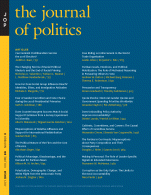Image

What Makes Foreign Policy Teams Tick: Explaining Variation in Group Performance at Geopolitical Forecasting
Publication Year
2019
Type
Journal Article
Abstract
When do groups—be they countries, administrations, or other organizations—more or less accurately understand the world around them and assess political choices? Some argue that group decision-making processes often fail due to biases induced by groupthink. Others argue that groups, by aggregating knowledge, are better at analyzing the foreign policy world. To advance knowledge about the intersection of politics and group decision making, this paper draws on evidence from a multiyear geopolitical forecasting tournament with thousands of participants sponsored by the US government. We find that teams outperformed individuals in making accurate geopolitical predictions, with regression discontinuity analysis demonstrating specific teamwork effects. Moreover, structural topic models show that more cooperative teams outperformed less cooperative teams. These results demonstrate that information sharing through groups, cultivating reasoning to hedge against cognitive biases, and ensuring all perspectives are heard can lead to greater success for groups at forecasting and understanding politics.
Journal
The Journal of Politics
Volume
81
Issue
4
Pages
1388-1404
DOI
Data and Code on Dataverse

